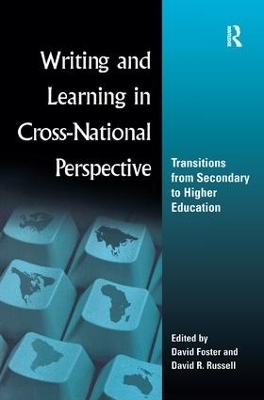
Writing and Learning in Cross-national Perspective
Transitions From Secondary To Higher Education
Seiten
2017
Routledge (Verlag)
978-1-138-43775-3 (ISBN)
Routledge (Verlag)
978-1-138-43775-3 (ISBN)
A discussion of the role of writing in various educational systems and cultures. The editors compare US post-secondary writing practices and pedagogies with those in other national systems, and suggest perspectives for cross-national study of learning/writing issues for all educational systems.
Despite the increasingly global implications of conversations about writing and learning, U.S. composition studies has devoted little attention to cross-national perspectives on student writing and its roles in wider cultural contexts. Caught up in our own concerns about how U.S. students make the transition as writers from secondary school to postsecondary education, we often overlook the fact that students around the world are undergoing the same evolution. How do the students in China, England, France, Germany, Kenya, or South Africa--the educational systems represented in this collection--write their way into the communities of their chosen disciplines? How, for instance, do students whose mother tongue is not the language of instruction cope with the demands of academic and discipline-specific writing? And in what ways is U.S. students' development as academic writers similar to or different from that of students in other countries? With this collection, editors David Foster and David R. Russell broaden the discussion about the role of writing in various educational systems and cultures. Students' development as academic writers raises issues of student authorship and agency, as well as larger issues of educational access, institutional power relations, system goals, and students' roles in society. The contributors to this collection discuss selected writing purposes and forms characteristic of a specific national education system, describe students' agency as writers, and identify contextual factors--social, economic, linguistic, cultural--that shape institutional responses to writing development. In discussions that bookend these studies of different educational structures, the editors compare U.S. postsecondary writing practices and pedagogies with those in other national systems, and suggest new perspectives for cross-national study of learning/writing issues important to all educational systems. Given the worldwide increase in students en
Despite the increasingly global implications of conversations about writing and learning, U.S. composition studies has devoted little attention to cross-national perspectives on student writing and its roles in wider cultural contexts. Caught up in our own concerns about how U.S. students make the transition as writers from secondary school to postsecondary education, we often overlook the fact that students around the world are undergoing the same evolution. How do the students in China, England, France, Germany, Kenya, or South Africa--the educational systems represented in this collection--write their way into the communities of their chosen disciplines? How, for instance, do students whose mother tongue is not the language of instruction cope with the demands of academic and discipline-specific writing? And in what ways is U.S. students' development as academic writers similar to or different from that of students in other countries? With this collection, editors David Foster and David R. Russell broaden the discussion about the role of writing in various educational systems and cultures. Students' development as academic writers raises issues of student authorship and agency, as well as larger issues of educational access, institutional power relations, system goals, and students' roles in society. The contributors to this collection discuss selected writing purposes and forms characteristic of a specific national education system, describe students' agency as writers, and identify contextual factors--social, economic, linguistic, cultural--that shape institutional responses to writing development. In discussions that bookend these studies of different educational structures, the editors compare U.S. postsecondary writing practices and pedagogies with those in other national systems, and suggest new perspectives for cross-national study of learning/writing issues important to all educational systems. Given the worldwide increase in students en
David Foster
Contents: D.R. Russell, D. Foster, Introduction: Rearticulating Articulation. X-M. Li, Track (Dis)Connecting: Chinese High School and University Writing in a Time of Change. M. Scott, Cracking the Codes Anew: Writing About Literature in England. C. Donahue, The Lycée -to-University Progression in French Students' Development as Writers. D. Foster, Making the Transition to University: Student Writers in Germany. M.N. Muchiri, An Academic Writer in Kenya: The Transition From Secondary School to the University. S. Shay, R. Moore With A. Cloete, Roles Under Construction: The Intersection of Writer Agency and Task Design in South Africa. D. Foster, D.R. Russell, Conclusion.
| Erscheinungsdatum | 07.08.2017 |
|---|---|
| Verlagsort | London |
| Sprache | englisch |
| Maße | 152 x 229 mm |
| Gewicht | 453 g |
| Themenwelt | Geisteswissenschaften ► Psychologie ► Allgemeine Psychologie |
| Geisteswissenschaften ► Psychologie ► Verhaltenstherapie | |
| Geisteswissenschaften ► Sprach- / Literaturwissenschaft ► Sprachwissenschaft | |
| ISBN-10 | 1-138-43775-1 / 1138437751 |
| ISBN-13 | 978-1-138-43775-3 / 9781138437753 |
| Zustand | Neuware |
| Haben Sie eine Frage zum Produkt? |
Mehr entdecken
aus dem Bereich
aus dem Bereich
Buch | Softcover (2024)
Hogrefe Verlag
34,95 €


